- Home
- Harlan Ellison
Deathbird Stories Page 5
Deathbird Stories Read online
Page 5
We walked around the Square. My unicorn was waiting at the cab. I scratched his rainbow flank and he struck a spark off the cobblestones with his right front hoof. “I know,” I said to him, “we’ll soon start the downhill side. But not just yet. Be patient. I won’t forget you.”
Lizette and I went inside the Café Du Monde and I ordered two coffees with warm milk and two orders of beignets from a waiter who was originally from New Jersey but had lived most of his life only a few miles from College Station, Texas.
There was a coolness coming off the levee.
“I was in New York,” I said. “I was receiving an award at an architects’ convention–did I mention I was an architect–yes, that’s what I was at the time, an architect–and I did a television interview. The mother saw me on the program, and checked the newspapers to find out what hotel we were using for the convention, and she got my room number and called me. I had been out quite late after the banquet where I’d gotten my award, quite late. I was sitting on the side of the bed, taking off my shoes, my tuxedo tie hanging from my unbuttoned collar, getting ready just to throw clothes on the floor and sink away, when the phone rang, It was the mother. She was a terrible person, one of the worst I ever knew, a shrike, a terrible, just a terrible person. She started telling me about Bernice in the asylum. How they had her in this little room and how she stared out the window most of the time. She’d reverted to childhood, and most of the time she couldn’t even recognize the mother; but when she did, she’d say something like, ‘Don’t let them hurt me, Mommy, don’t let them hurt me.’ So I asked her what she wanted me to do, did she want money for Bernice or what…Did she want me to go see her since I was in New York…and she said God no. And then she did an awful thing to me. She said the last time she’d been to see Bernice, my ex-wife had turned around and put her fingers to her lips and said, ‘Shhh, we have to be very quiet. Paul is working.’ And I swear, a snake uncoiled in my stomach. It was the most terrible thing I’d ever heard. No matter how secure you are that you honest to God had not sent someone to a madhouse, there’s always that little core of doubt, and saying what she’d said just burned out my head. I couldn’t even think about it, couldn’t even really hear it, or it would have collapsed me. So down came these iron walls and I just kept on talking, and after a while she hung up.
“It wasn’t till two years later that I allowed myself to think about it, and then I cried; it had been a long time since I’d cried. Oh, not because I believed that nonsense about a man isn’t supposed to cry, but just because I guess there hadn’t been anything that important to cry about. But when I let myself hear what she’d said, I started crying, and just went on and on till I finally went in and looked into the bathroom mirror and I asked myself, face-to-face, if I’d done that, if I’d ever made her be quiet so I could work on blueprints or drawings…
“And after a while I saw myself shaking my head no, and it was easier. That was perhaps three years before I died.”
She licked the powdered sugar from the beignets off her fingers, and launched into a long story about a lover she had taken. She didn’t remember his name.
It was sometime after midnight. I’d thought midnight would signal the start of the downhill side, but the hour had passed, and we were still together, and she didn’t seem ready to vanish. We left the Café du Monde and walked into the Quarter.
I despise Bourbon Street. The strip joints, with the pasties over nipples, the smell of need, the dwarfed souls of men attuned only to flesh. The noise.
We walked through it like art connoisseurs at a showing of motel room paintings. She continued to talk about her life, about the men she had known, about the way they had loved her, the ways in which she had spurned them, and about the trivia of her past existence. I continued to talk about my loves, about all the women I had held dear in my heart for however long each had been linked with me. We talked across each other, our conversation at right angles, only meeting in the intersections of silence at story’s end.
She wanted a julep and I took her to the Royal Orleans Hotel and we sat in silence as she drank. I watched her, studying that phantom face, seeking for even the smallest flicker of light off the ice in her eyes, hoping for an indication that glacial melting could be forthcoming. But there was nothing, and I burned to say correct words that might cause heat. She drank and reminisced about evenings with young men in similar hotels, a hundred years before.
We went to a night club where a Flamenco dancer and his two-woman troupe performed on a stage of unpolished woods, their star-shining black shoes setting up resonances in me that I chose to ignore.
Then I realized there were only three couples in the club, and that the extremely pretty Flamenco dancer was playing to Lizette. He gripped the lapels of his bolero jacket and clattered his heels against the stage like a man driving nails. She watched him, and her tongue made a wholly obvious flirtatious trip around the rim of her liquor glass. There was a two-drink minimum, and as I have never liked the taste of alcohol, she was more than willing to prevent waste by drinking mine as well as her own. Whether she was getting drunk or simply indulging herself, I do not know. It didn’t matter. I became blind with jealousy, and dragons took possession of my eyes.
When the dancer was finished, when his half hour show was concluded, he came to our table. His suit was skintight and the color of Arctic lakes. His hair was curly and moist from his exertions, and his prettiness infuriated me. There was a scene. He asked her name, I interposed a comment, he tried to be polite, sensing my ugly mood, she overrode my comment, he tried again in Castilian, thing his esses, she answered, I rose and shoved him, there was a scuffle. We were asked to leave.
Once outside, she walked away from me.
My unicorn was at the curb, eating from a porcelain Sèvres soup plate filled with flan. I watched her walk unsteadily up the street toward Jackson Square. I scratched my unicorn’s neck and he stopped eating the egg custard. He looked at me for a long moment. Ice crystals were sparkling in his mane.
We were on the downhill side.
“Soon, old friend,” I said.
He dipped his elegant head toward the plate. “I see you’ve been to the Las Americas. When you return the plate, give my best to Señor Pena.”
I followed her up the street. She was walking rapidly toward the Square. I called to her, but she wouldn’t stop. She began drawing her left hand along the steel bars of the fence enclosing the Square. Her fingertips thudded softly from bar to bar, and once I heard the chitinous clak of a manicured nail.
“Lizette!”
She walked faster, dragging her hand across the dark metal bars.
“Lizette! Damn it!”
I was reluctant to run after her; it was somehow terribly demeaning. But she was getting farther and farther away. There were bums in the Square, sitting slouched on the benches, their arms out along the backs. Itinerants, kids with beards and knapsacks. I was suddenly frightened for her. Impossible. She had been dead for a hundred years. There was no reason for it…I was afraid for her!
I started running, the sound of my footsteps echoing up and around the Square. I caught her at the corner and dragged her around. She tried to slap me, and I caught her hand. She kept trying to hit me, to scratch my face with the manicured nails. I held her and swung her away from me, swung her around, and around, dizzyingly, trying to keep her off-balance. She swung wildly, crying out and saying things inarticulately. Finally, she stumbled and I pulled her in to me and held her tight against my body.
“Stop it! Stop, Lizette! I…Stop it!” She went limp against me and I felt her crying against my chest. I took her into the shadows and my unicorn came down Decatur Street and stood under a streetlamp, waiting.
The chimera winds rose. I heard them, and knew we were well on the downhill side, that time was growing short. I held her close and smelled the woodsmoke scent of her hair. “Listen to me,” I said,
softly, close to her. “Listen to me, Lizette. Our time’s almost gone. This is our last chance. You’ve lived in stone for a hundred years; I’ve heard you cry. I’ve come there, to that place, night after night, and I’ve heard you cry. You’ve paid enough, God knows. So have I. We can do it. We’ve got one more chance, and we can make it, if you’ll try. That’s all I ask. Try.”
She pushed away from me, tossing her head so the auburn hair swirled away from her face. Her eyes were dry. Ghosts can do that. Cry without making tears. Tears are denied us. Other things; I won’t talk of them here.
“I lied to you,” she said.
I touched the side of her face. The high cheekbone just at the hairline. “I know. My unicorn would never have let you touch him if you weren’t pure. I’m not, but he has no choice with me. He was assigned to me. He’s my familiar and he puts up with me. We’re friends.”
“No. Other lies. My life was a lie. I’ve told them all to you. We can’t make it. You have to let me go.”
I didn’t know exactly where, but I knew how it would happen. I argued with her, trying to convince her there was a way for us. But she couldn’t believe it, hadn’t the strength or the will or the faith. Finally, I let her go.
She put her arms around my neck and drew my face down to hers, and she held me that way for a few moments. Then the winds rose, and there were sounds in the night, the sounds of calling, and she left me there, in the shadows.
I sat down on the curb and thought about the years since I’d died. Years without much music. Light leached out. Wandering. Nothing to pace me but memories and the unicorn. How sad I was for him; assigned to me till I got my chance. And now it had come and I’d taken my best go, and failed.
Lizette and I were the two sides of the same coin; devalued and impossible to spend. Legal tender of nations long since vanished, no longer even names on the cracked papyrus of cartographers’ maps. We had been snatched away from final rest, had been set adrift to roam for our crimes, and only once between death and eternity would we receive a chance. This night…this nothing-special night…this was our chance.
My unicorn came to me, then, and brushed his muzzle against my shoulder. I reached up and scratched around the base of his spiral horn, his favorite place. He gave a long, silvery sigh, and in that sound I heard the sentence I was serving on him, as well as myself. We had been linked, too. Assigned to one another by the one who had ordained this night’s chance. But if I lost out, so did my unicorn; he who had wandered with me through all the soundless, lightless years.
I stood up. I was by no means ready to do battle, but at least I could stay in for the full ride…all the way on the downhill side. “Do you know where they are?”
My unicorn started off down the street.
I followed, hopelessness warring with frustration. Dusk to dawn is the full ride, the final chance. After midnight is the downhill side. Time was short, and when time ran out there would be nothing for Lizette or me or my unicorn but time. Forever.
When we passed the Royal Orleans Hotel I knew where we were going. The sound of the Quarter had already faded. It was getting on toward dawn. The human lice had finally crawled into their flesh-mounds to sleep off the night of revelry. Though I had never experienced directly the New Orleans in which Lizette had grown up, I longed for the power to blot out the cancerous blight that Bourbon Street and the Quarter had become, with its tourist filth and screaming neon, to restore it to the colorful yet healthy state in which it had thrived a hundred years before. But I was only a ghost, not one of the gods with such powers, and at that moment I was almost at the end of the line held by one of those gods.
My unicorn turned down dark streets, heading always in the same general direction, and when I saw the first black shapes of the tombstones against the night sky, the lightening night sky, I knew I’d been correct in my assumption of destination.
The Saint Louis Cemetery.
Oh, how I sorrow for anyone who has never seen the world-famous Saint Louis Cemetery in New Orleans. It is the perfect graveyard, the complete graveyard, the finest graveyard in the universe. (There is a perfection in some designs that informs the function totally. There are Danish chairs that could be nothing but chairs, are so totally and completely chair that if the world as we knew it ended, and a billion years from now the New Orleans horsy cockroaches became the dominant species, and they dug down through the alluvial layers, and found one of those chairs, even if they themselves did not use chairs, were not constructed physically for the use of chairs, had never seen a chair, still they would know it for what it had been made to be: a chair. Because it would be the essence of chairness. And from it, they could reconstruct the human race in replica. That is the kind of graveyard one means when one refers to the world-famous Saint Louis Cemetery.)
The Saint Louis Cemetery is ancient. It sighs with shadows and the comfortable bones and their afterimages of deaths that became great merely because those who died went to be interred in the Saint Louis Cemetery. The water table lies just eighteen inches below New Orleans–there are no graves in the earth for that reason. Bodies are entombed aboveground in crypts, in sepulchers, vaults, mausoleums. The gravestones are all different, no two alike, each one a testament to the stonecutter’s art. Only secondarily testaments to those who lie beneath the markers.
We had reached the moment of final nightness. That ultimate moment before day began. Dawn had yet to fill the eastern sky, yet there was a warming of tone to the night; it was the last of the downhill side of my chance. Of Lizette’s chance.
We approached the cemetery, my unicorn and I. From deep in the center of the skyline of stones beyond the fence I could see the ice-chill glow of a pulsing blue light. The light one finds in a refrigerator, cold and flat and brittle.
I mounted my unicorn, leaned close along his neck, clinging to his mane with both hands, knees tight to his silken sides, now rippling with light and color, and I gave a little hiss of approval, a little sound of go.
My unicorn sailed over the fence, into the world-famous Saint Louis Cemetery.
I dismounted and thanked him. We began threading our way between the tombstones, the sepulchers, the crypts.
The blue glow grew more distinct. And now I could hear the chimera winds rising, whirling, coming in off alien seas. The pulsing of the light, the wail of the winds, the night dying. My unicorn stayed close. Even we of the spirit world know when to be afraid.
After all, I was only operating off a chance; I was under no god’s protection. Naked, even in death.
There is no fog in New Orleans.
Mist began to form around us.
Except sometimes in the winter, there is no fog in New Orleans.
I remembered the daybreak of the night I’d died. There had been mist. I had been a suicide.
My third wife had left me. She had gone away during the night, while I’d been at a business meeting with a client; I had been engaged to design a church in Baton Rouge. All that day I’d steamed the old wallpaper off the apartment we’d rented. It was to have been our first home together, paid for by the commission. I’d done the steaming myself, with a tall ladder and a steam condenser and two flat pans with steam holes. Up near the ceiling the heat had been so awful I’d almost fainted. She’d brought me lemonade, freshly squeezed. Then I’d showered and changed and gone to my meeting. When I’d returned, she was gone. No note.
Lizette and I were two sides of the same coin, cast off after death for the opposite extremes of the same crime. She had never loved. I had loved too much. Overindulgence in something as delicate as love is to be found monstrously offensive in the eyes of the God of Love. And some of us–who have never understood the salvation in the Golden Mean–some of us are cast adrift with but one chance. It can happen.
Mist formed around us, and my unicorn crept close to me, somehow smaller, almost timid. We are moving into realms he did not understand
, where his limited magics were useless. These were realms of potency so utterly beyond even the limbo creatures–such as my unicorn–so completely alien to even the intermediary zone wanderers–Lizette and myself–that we were as helpless and without understanding as those who live. We had only one advantage over living, breathing, as yet undead humans: we knew for certain that the realms on the other side existed.
Above, beyond, deeper: where the gods live. Where the one who had given me my chance, had given Lizette her chance, where He lived. Undoubtedly watching.
The mist swirled up around us, as chill and final as the dust of pharaohs’ tombs.
We moved through it, toward the pulsing heart of blue light. And as we came into the penultimate circle, we stopped. We were in the outer ring of potency, and we saw the claiming things that had come for Lizette. She lay out on an altar of crystal, naked and trembling. They stood around her, enormously tall and transparent. Man shapes without faces. Within their transparent forms a strange, silvery fog swirled, like smoke from holy censers. Where eyes should have been on a man or a ghost, there were only dull flickering firefly glowings, inside, hanging in the smoke, moving, changing shape and position. No eyes at all. And tall, very tall, towering over Lizette and the altar.
For me, overcommitted to love, when dawn came without salvation, there was only an eternity of wandering, with my unicorn as sole companion. Ghost forevermore. Incense chimera viewed as dust-devil on the horizon, chilling as I passed in city streets, forever gone, invisible, lost, empty, helpless, wandering.
But for her, empty vessel, the fate was something else entirely. The God of Love had allowed her the time of wandering, trapped by day in stones, freed at night to wander. He had allowed her the final chance. And having failed to take it, her fate was with these claiming creatures, gods themselves…of another order…higher or lower I had no idea. But terrible.
“Lagniappe!” I screamed the word. The old Creole word they used in New Orleans when they want a little extra; a bonus of croissants, a few additional carrots dumped into the shopping bag, a baker’s dozen, a larger portion of clams or crabs or shrimp. “Lagniappe! Lizette, take a little more! Try for the extra! Try…demand it…there’s time…you have it coming to you…you’ve paid…I’ve paid…it’s ours…try!”

 Repent, Harlequin! Said the Ticktockman
Repent, Harlequin! Said the Ticktockman Broken Glass
Broken Glass Other Glass Teat
Other Glass Teat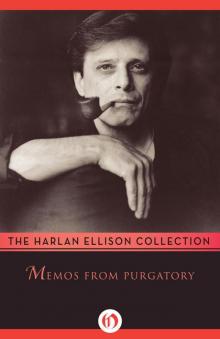 Memos From Purgatory
Memos From Purgatory I Have No Mouth and I Must Scream
I Have No Mouth and I Must Scream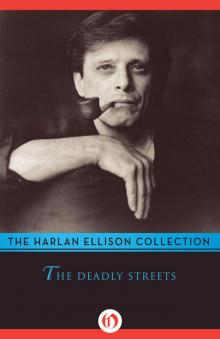 The Deadly Streets
The Deadly Streets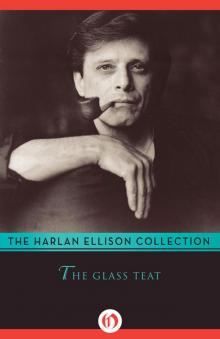 The Glass Teat
The Glass Teat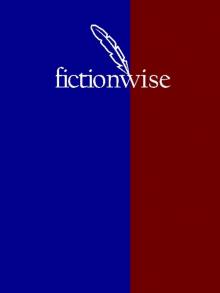 Paingod and Other Delusions
Paingod and Other Delusions No Doors No Windows
No Doors No Windows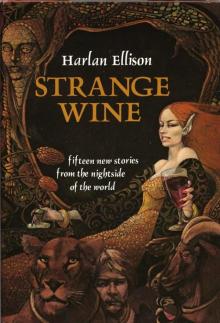 Strange Wine
Strange Wine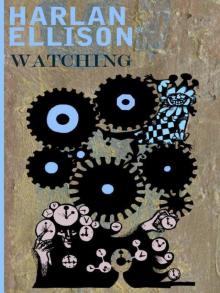 Harlan Ellison's Watching
Harlan Ellison's Watching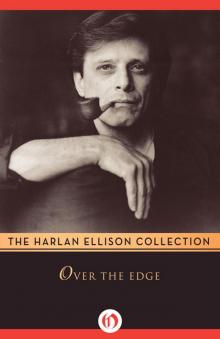 Over the Edge/An Edge in My Voice
Over the Edge/An Edge in My Voice Troublemakers: Stories by Harlan Ellison
Troublemakers: Stories by Harlan Ellison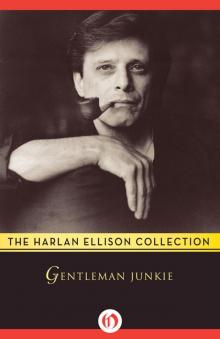 Gentleman Junkie and Other Stories of the Hung-Up Generation
Gentleman Junkie and Other Stories of the Hung-Up Generation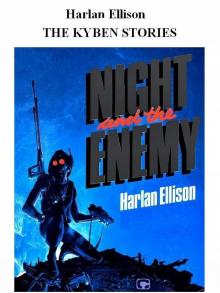 The Kyben Stories
The Kyben Stories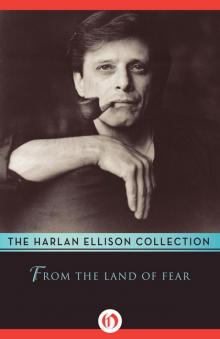 From the Land of Fear
From the Land of Fear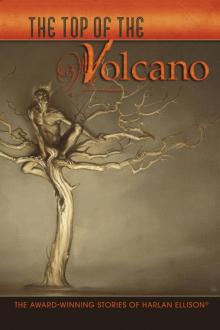 The Top of the Volcano: The Award-Winning Stories of Harlan Ellison
The Top of the Volcano: The Award-Winning Stories of Harlan Ellison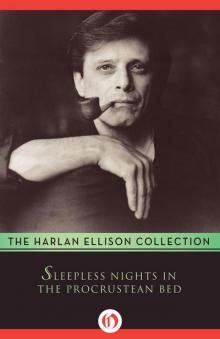 Sleepless Nights in the Procrustean Bed
Sleepless Nights in the Procrustean Bed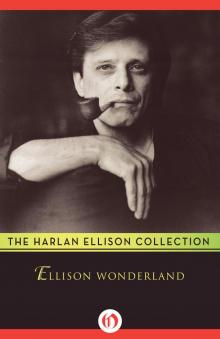 Ellison Wonderland
Ellison Wonderland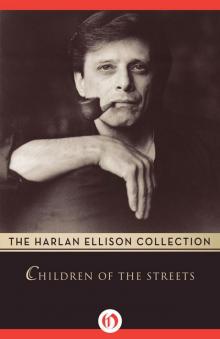 Children of the Streets
Children of the Streets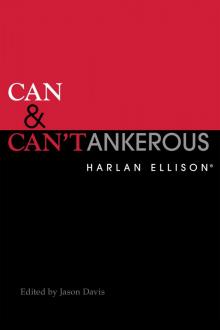 Can & Can'tankerous
Can & Can'tankerous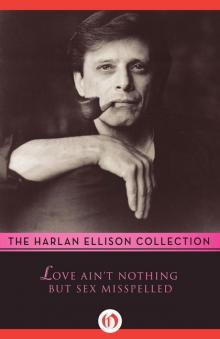 Love Ain't Nothing but Sex Misspelled
Love Ain't Nothing but Sex Misspelled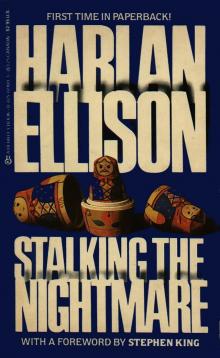 Stalking the Nightmare
Stalking the Nightmare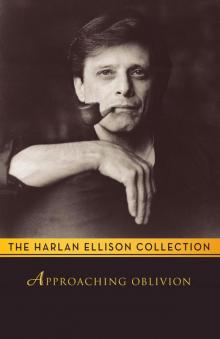 Approaching Oblivion
Approaching Oblivion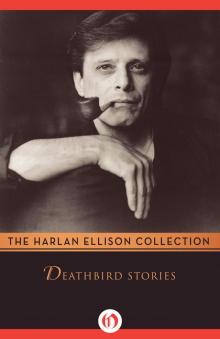 Deathbird Stories
Deathbird Stories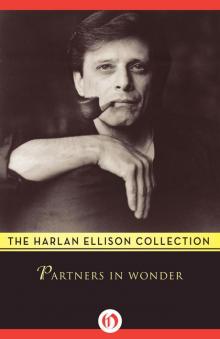 Partners in Wonder
Partners in Wonder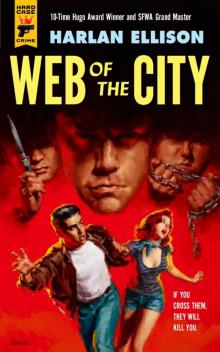 Web of the City
Web of the City Spider Kiss
Spider Kiss A Boy and His Dog
A Boy and His Dog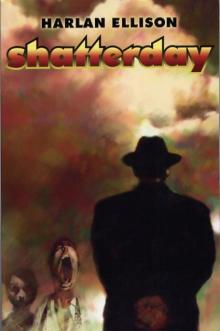 Shatterday
Shatterday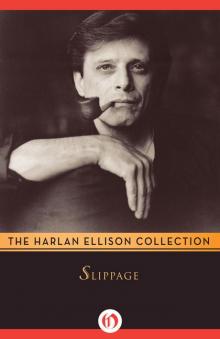 Slippage: Previously Uncollected, Precariously Poised Stories
Slippage: Previously Uncollected, Precariously Poised Stories Repent, Harlequin! Said the Ticktockman
Repent, Harlequin! Said the Ticktockman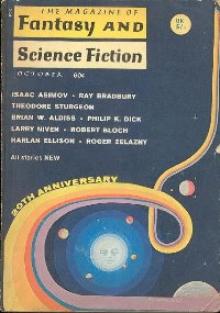 Come to Me Not in Winter's White
Come to Me Not in Winter's White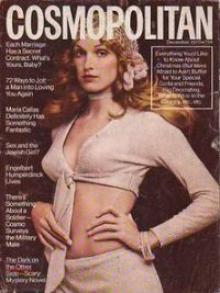 The Song the Zombie Sang
The Song the Zombie Sang The Other Glass Teat
The Other Glass Teat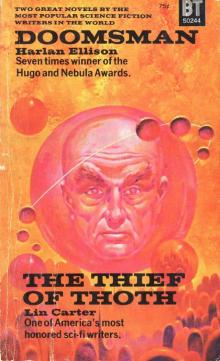 Doomsman - the Theif of Thoth
Doomsman - the Theif of Thoth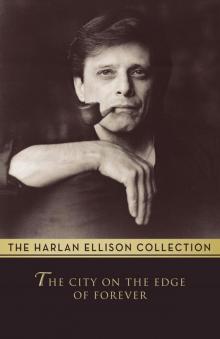 The City on the Edge of Forever
The City on the Edge of Forever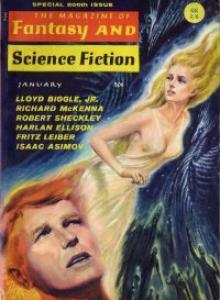 I See a Man Sitting on a Chair, and the Chair Is Biting His Leg
I See a Man Sitting on a Chair, and the Chair Is Biting His Leg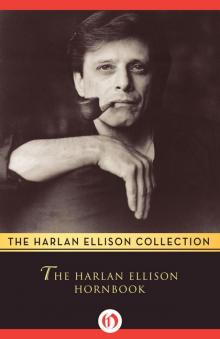 The Harlan Ellison Hornbook
The Harlan Ellison Hornbook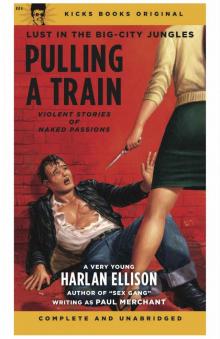 Pulling A Train
Pulling A Train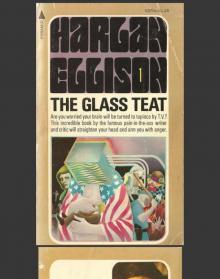 The Glass Teat - essays of opinion on the subject of television
The Glass Teat - essays of opinion on the subject of television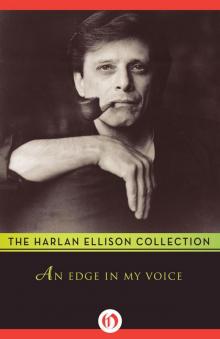 An Edge in My Voice
An Edge in My Voice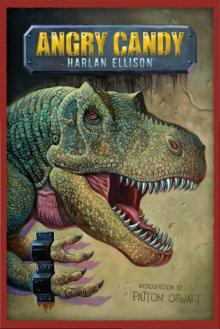 Angry Candy
Angry Candy Troublemakers
Troublemakers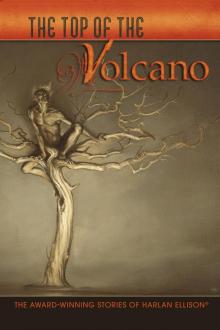 The Top of the Volcano
The Top of the Volcano Over the Edge
Over the Edge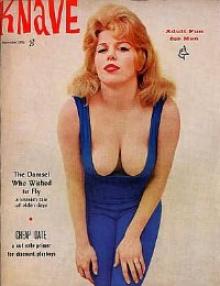 Survivor #1
Survivor #1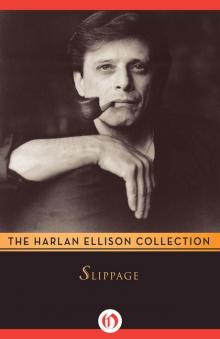 Slippage
Slippage